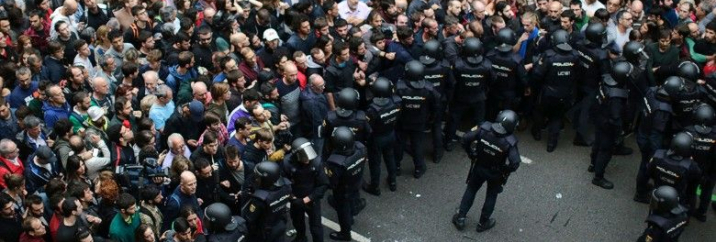Hannah Arendt (1970) points out that one of the situations in which civil disobedience emerges is when a significant number of citizens become convinced that the regular channels for changing laws have stopped working and that their demands will consequently not be heard nor resolved. According to Arendt, in these situations change will always be the result of extra-legal action. Later on, the law will be able to stabilise and normalise the change, but it will have been necessary to disobey current legality to produce it.

Following this schema, the denial of the right to self-determination by the powers of the Spanish State—that is, the fact of prohibiting the Catalan people from being what they collectively decide to be—makes the road of disobedience necessary to finally realise and exercise a right claimed by a significant number of people. It was this desire to decide on the part of the Catalans combined with the blocking of the Spanish State that gave rise to the disobedient referendum of October 1, 2017. Given the context of the Spanish State, the effective exercise of self-determination requires the prior and continuous exercise of the right to disobey.
A whole series of features characterise disobedience. Whoever disobeys does not hide away—quite the contrary. Disobedient action makes sense to the degree that it is public and shared. The aim is to focus through the disobedient action all possible attention on the injustice that is being denounced. That is why whoever disobeys assumes the legal consequences of their action. That is why, assuming repression, we defended the schools throughout the referendum. Or why exile and jail are accepted as involved in the defense of the same referendum. Repression and penal sentences make injustice visible by exposing the State as their author. Repression starts to turn against the repressor. In this way, we appeal for participation from all those who are sensitive to the justice of the cause.
What is involved is not an individual act but an eminently collective one: disobedience is undertaken on behalf of and in defence of the interests of a community. In this sense active, non-violent civil disobedience and resistance allows us to make clear something that in a context of obedience and consent the state apparatus has the capacity to keep virtually invisible—its eminently coercive and repressive character. In short, all that which keeps us subject to the wills and interests of the governing elites, be they regional, State and European.
What we are dealing with is a strategy of political confrontation that, through the defence and assertion of denied social and/or political rights, looks to make the undermining of established power a means to build consciousness and mobilisation. With October 1, prison and exile did more for the internationalisation of the process of Catalan self-determination than any action of the Catalan government could have achieved in thirty years. Through those actions, the profoundly anti-democratic character of the Spanish State, in its 1978 regime version, is slowly emerging into the open.
This situation exemplifies the logic of active and non-violent disobedience practically to perfection. On the one hand, it is clear that disobedience entails very high costs, such as those assumed by the victims of the reprisals, beginning with imprisonment and exile. Repression by a state that is being disobeyed involves, as we are seeing, situations of threat, exile and prison. However, it also becomes clear that resistance and persistence in disobedience will turn this situation around, and that the costs to the State of maintaining repression will become increasingly great and harder to withstand, both domestically and internationally.
The referendum of October 1 thus means, in terms of power and the State, a point of no return: for better or for worse, nothing will ever be the same as before. Having taken the path of disobedience, our choice now becomes whether we persist in the search for and building of a fairer future for all or whether—now that the beast of the 1978 has been unleashed–we bow heads and accept a future with even less rights and freedoms than those that we have apparently had to date. The events of September and the first days of October 2017 are the reality that points out the road for us to follow. Over and above the referendum results and the high participation in a context of great repression, what really stands out about the referendum is the combination that took place between institutional disobedience and civic-popular disobedience.
In point of fact, the disobedience of the October 1 referendum was the key that began to open all the locks forged in Spain in 1978. Recent months reveal and confirm that this is the only way we will shift the international community and the State. That’s because the goal of disobedience is never to impose anything on anyone—an oxymoron as unsustainable as it is unacceptable–but to build a framework in which rights demanded can be exercised. Disobedience does not aim to end the legal system, but to transform it so as to make it more respectful of the social and political reality of a specific historical moment. To transform it, not just to benefit only and exclusively those demanding change—with the rest forgotten–but to build a qualitatively and definitively better social framework for everyone.
Moreover, the path of disobedience does not rule out scenarios of agreement, but rather makes them possible by generating the conditions necessary for both the international community and Spain to be forced to recognise the right to self-determination. It is therefore the only possible path towards a democratic resolution of the conflict, especially taking into account the attitude and position of the Spanish State.
It won’t happen tomorrow. And not without more suffering. But if we have decided upon and socially constructed the goal of self-determination as a right to be exercised, this should be the objective shared by all who believe that there can be no better future than that we decide together.



